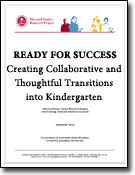The Harvard Family Research Project separated from the Harvard Graduate School of Education to become the Global Family Research Project as of January 1, 2017. It is no longer affiliated with Harvard University.

|
September 20, 2012 Ready for Success: Creating Collaborative and Thoughtful Transitions into KindergartenChristine Patton, Justina Wang |
Article Information
- Full Text (HTML)
- Full Text (PDF: 185 kb)
Related Resources
FINE Newsletter, Volume IV, Issue 3
Issue Topic: Facilitating Continuous Family Engagement
Resources and Research from Harvard Family Research Project
Change frequently involves challenges, and the transition each year for more than 3.5 million young learners from preschool or other early learning settings into kindergarten is no exception. Very much a rite of passage evoking a range of emotions from anxiety to excitement, this event represents a significant milestone in the lives of both children and their families, who all face numerous adjustments as they navigate the new learning terrain. Given that early social performance and academic achievement are predictors of later school success, it is imperative that children get off to a good start in kindergarten.
In this brief, Christine Patton and Justina Wang, from Harvard Family Research Project, look at ways of helping to make the transition into kindergarten a positive experience that will serve as a foundation to help children reach their full potential throughout their school years. The brief highlights promising practices in six states—New Jersey, Georgia, Maryland, Minnesota, Virginia, and California—where local- and state-level leadership support a variety of initiatives to ensure successful transitions into kindergarten. The authors examine effective collaborative approaches in which state departments of education, advocacy organizations, school districts, early education teachers, kindergarten teachers, families, and community members work together to help kindergartners enter school ready to begin this pivotal new phase of their lives.
The six states featured have each developed an integrated approach to the transition into kindergarten through the use of two or more of the following types of supports:
- Aligned assessments, standards, and curriculum
- Professional development
- Programs for special populations
- Communication and dissemination
Promising local-level transition practices include:
- Transition teams
- Feedback surveys
- Ongoing/year-round activities
The brief concludes with a set of recommendations for policymakers to help support these innovative practices at the local, state, and federal levels. State and federal policies to support collaborative and thoughtful transitions should accomplish the following:
- Promote the importance of family and community partnerships during transitions through reporting and accountability systems.
- Make joint preschool and kindergarten training and professional development opportunities available to increase teachers’ knowledge of transition practices.
- Build capacity for continued statewide and regional sharing of promising practices.
- Provide districts with funding opportunities to support their transition practices.
This resource is part of the September 2012 FINE Newsletter. The FINE Newsletter shares the newest and best family involvement research and resources from Harvard Family Research Project and other field leaders. To access the archive of past issues, please visit www.hfrp.org/FINENewsletter.
